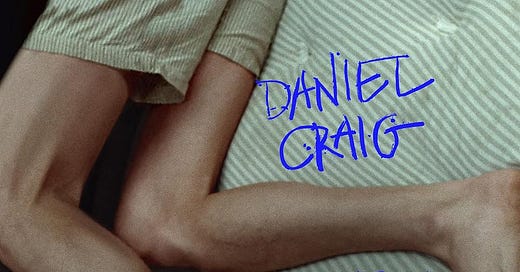Film Review Double Feature: "Queer," "Babygirl," and the Desire for Connection
Two of this fall's most provocative dramas use illicit sexual desire to explore what it means to forge unusual bonds in unexpected places.
Hello, dear reader! Do you like what you read here at Omnivorous? Do you like reading fun but insightful takes on all things pop culture? Do you like supporting indie writers? If so, then please consider becoming a subscriber and get the newsletter delivered straight to your inbox. There are a number of paid options, but you can also sign up for free! Every little bit helps. Thanks for reading and now, on with the show!
Warning: Full spoilers for the films ahead.
It’s no secret that we’re living in a rather sexless period when it comes to the movies, with the big studios proving remarkably and depressingly reticent about exploring the erotic on the big screen. Fortunately, however, this year we got two films that tackle desire head-on. In their different ways, both Luca Guadagnino’s Queer and Halina Reijn’s Babygirl are all about the desperate, potently erotic desire for connection across difference, whether it be across age or across power, showing how the yearning for connection and satisfaction remains a key part of what it means to be human.
When Queer begins Daniel Craig’s William Lee is living a very dissolute life in Mexico City, drinking and falling into bed with any beautiful young man that falls into his path. The moment he lays eyes on Eugene Allerton (Drew Starkey), however, it’s clear that there’s something about the young man that calls to him in a way that he can’t ignore and that goes beyond what he’s felt before. Thus, it’s not long before he’s pursuing him with almost single-minded determination, and the two begin a rather fraught and difficult relationship, one that is premised on Allerton maintaining distance from Lee. In the end, despite how much they’ve shared, Lee ends up alone again, his beloved vanished, never to be seen again.
There’s a raw and committed intensity to Craig’s performance, and one gets the feeling that Lee is a man whose debauchery and indulgence in various substances is all in pursuit of a human connection that stubbornly eludes him. There’s a feverishness to his pursuits, one made all the more intense by the film’s setting in Mexico City, where every erotic encounter has something seedy about it. While not every element of the film worked for me (more on that in a moment), I did appreciate the extent to which Craig was able to give us a character who is largely unfiltered and unapologetic about his desires, for all that said desires–whether for another human body or for the abandon enabled by hallucinogens–seem to lead him down a dark and perilous road.
A friend of mine remarked that Queer is in large part about the desperate desire for queer connection and the stymying of that desire, and for all of its narrative inconsistencies and lack of discipline (the film is based on a based on a William S. Burroughs novel, after all), I think the film succeeds in this regard. No matter how hard Lee tries to forge a lasting and meaningful connection with the younger Allerton, the young man always keeps himself at an emotional remove, a distance that only inflames Lee’s desire all the more. At one particularly painful and poignant moment, after the two have engaged in some rather fevered lovemaking, he plaintively inquires as to whether Eugene terribly minds what they do together. It’s one of those moments that pricks the heart, particularly if one has ever been in a relationship in which the intensity of one’s emotional and physical feelings are not returned in equal measure.
I’ll admit that the film rather lost me in the third act, as Lee and Allerton go deep into the jungle in pursuit of a potent hallucinogen, running into an almost unrecognizable Lesley Manville (playing a character named Dr. Cotter) in the process. Though this part of the film wasn’t for me, I can see what Luca Guadagnino was going for here. The pursuit of the ayahuasca, and their little drug-fueled interlude that follows, blurs their identities until one seems to literally become the other. This is the state toward which Lee has been aspiring the entire film, and it’s perhaps fitting that he only manages to attain it when they are both under the influence of a potent hallucinogen and far away from the confines of civilization. Unbound by the rules, they can finally find a complementarity that can never be attained anywhere else.
The tragedy, though, is that this moment is always doomed to be fragmentary and impermanent. For all of his beauty, Allerton has never truly been in love with (or obsessed with, depending on how one reads Lee’s behavior) with the other man. He might be willing to offer his body up for the other’s delectation; he might even take pleasure in what they do together. At root, though, he’s just another beautiful but unavailable young Adonis, leaving a string of broken hearts behind him.
Of all of the directors working today, Luca Guadagnino is one of those who seems to have a truly intrinsic understanding of human desire and the often-mad lengths to which people will go when under its thrall. Though Queer is more inconsistent than some of his other recent offerings–I personally think that Challengers is a better and, strangely enough, more focused film–it nevertheless contains its own poignancy and heartbreak. The last scene–in which Lee, now an old man on the edge of death, imagines Allerton beside him again–is particularly poignant. The desire to reach out and have one’s beloved reach out in return has been thwarted, leaving Lee, and us, to ponder the agony of being alone at the end.
Like Craig, Kidman leaves it all on the field in Babygirl, in which she portrays Romy, a powerful tech CEO who is trapped in a marriage that, on the surface, looks like it is fulfilling. It quickly becomes clear, however, that all is not well between Romy and husband Jacob (Antonio Banderas), that beneath their fevered sex life there is a yawning chasm of desire that Romy is unable to fulfill with her husband, no matter how much she pretends otherwise.
Kidman is one of those stars who has the almost uncanny ability to wring both pathos and eroticism from the same role, and Romy allows her to demonstrate that skill to the hilt. Whether it’s bringing herself to orgasm by watching porn or submitting to Samuel, the intern with whom she strikes up a quasi-relationship, you can’t help but feel with Romy as she makes her way through all of the feelings of the human emotional spectrum. Her every scene with Harris crackles with intensity, and he matches her performance and her energy, and from the moment that we see him bring a dog to heel on the streets of New York it’s clear that Romy sees in his effortless alpha energy the thing that she’s been looking for but has never been given.
The fact that this entire scene is rendered through Romy’s point of view complicates any reading of the film that wants to reduce this to a sort of fantasy in which a woman is reduced to nothing This is, I would argue, a perfect example of the female gaze, and from the moment that their eyes meet it’s clear that the younger man offers Romy something that she hasn’t been able to find anywhere else in either her personal or professional life. He, likewise, seems to sense that there is something missing in her life and, confident young man that he is, he knows that he’s the one to provide it.
Of course, the course of true desire never did run smooth, and the very thing that makes their relationship so stimulating for Romy–the fact that she is his boss and he is nothing more than an intern–is precisely what brings her so close to the precipice of professional ruin, particularly once her assistant (and Samuel’s girlfriend) realizes what’s been going on. One gets the feeling that Romy understands all of this risk and relishes it, and such is the power of both the film’s atmosphere and Kidman’s performance that you can’t help but find yourself waiting with baited breath for this entire erotic edifice to come crashing down around both of them.
Ultimately Romy, unlike William Lee, manages to find the connection that she has so desperately sought, though not in the way that she might have expected. In the film’s final scene she is having what appears to be a fully satisfying erotic encounter with her husband, at last able to achieve the climax with him that previously eluded her. There’s a caveat, though: she’s only able to orgrasm because she’s imagining Samuel in a hotel room, a dog at his feet. It’s a deliciously ambiguous moment, puncturing the supposed romantic idyll that these two married characters have found. As much as Jacob seems to have found the missing key to giving his wife the type of pleasure that she has so long desired, one can’t escape the fact that it’s still Samuel who is the object of her desires and her fantasies.
In other words, Babygirl is just the type of deliciously provocative erotic thriller that Hollywood has largely avoided making in recent years. It poses difficult and thorny questions about women’s desires and the ways that they choose to fulfill them, and it features the perfect pairing of director and star, with both Halina Reijn and Kidman bringing everything they have to the film. Moreover, this film also reminds us of how little men sometimes know about the women in their lives and how adept they are at convincing themselves that they are fulfilling their lovers’ desires, often without even bothering to ask them whether they are doing so or not.
The ending reinforces the sense that, in the cinema as in life, it’s entirely possible for women to set up men as objects to be looked at, desired, and fetishized. For what else is Samuel in the end but a fetish object for Romy, a phantasmatic screen upon which she can project her own yearnings? It’s a neat inversion of the male gaze dynamic that so often structures the filmic imagination, and for that reason alone Babygirl is worth celebrating.
It’s hard to tell what lies in store for Hollywood and the rest of us when it comes to the on-screen representation of sexual desire. Let’s hope, however, that the powers-that-be recognize that some of us, at least, want to feel challenged at the cinema, even (especially) if that makes us feel uncomfortable.





